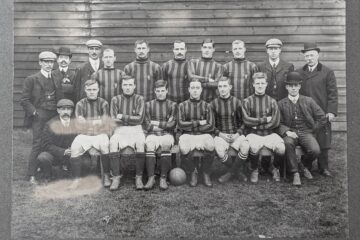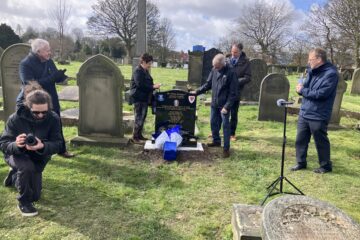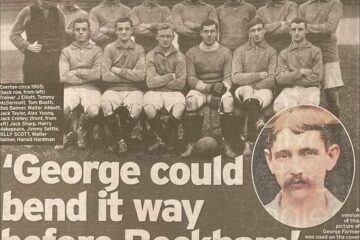Bethell Robinson was undoubtedly a man of many clubs. When the inaugural Football League season ended 30 March 1889, the Everton full-back Nick Ross returned to his former club Preston North End while his partner, Sandy Dick, returned to the family home in Kilmarnock. The club, however, had arranged fixtures that would take them in to the month of May so they invited several players to make a guest appearance.
One of this group was the much-travelled Bethell Robinson. Named after his father, he was born in April 1861 in the fishing port of Fleetwood, and was the first child of his Preston-born mother, Phebe. The 1871 census found Bethell, who now had two younger brothers, staying at the home of his grandmother in Poulton-le-Fylde because his parents were in the process of setting up a cabinet-making business at 6 Lord Street in Preston where the family would later settle. When his education was complete, Bethell started work as an assistant to the Town Clerk of Preston and became a founder member of the North End club who first played under Rugby rules before adopting those of the Football Association.
Lieutenant William Sudall (later to become Major) of the local Volunteer Force was the mentor of Bethell Robinson when he began his soccer career, accompanying “Cun” Duckworth at full-back. He had assumed the role of club secretary when he married Margaret Parker at Holy Trinity church 4 April 1882 and settled at 22 Milner Street in Preston. Mr Sudall, however, had noted the success enjoyed by the teams from neighbouring Blackburn and began to import players from Scotland and to pay them for their services. Rumours of ‘professionalism’ soon began to reach the ears of the officials at the FA headquarters in London who decided to investigate. Matters came to a head in January 1884 when, following a drawn FA Cup tie with Upton Park, the North End club were found guilty of infringing the rules and expelled from the competition. Robinson took part in that game but it was never made clear what he thought about those proceedings. However, he left Deepdale at the end of season to play for a local amateur side, Preston Zingari. Around December he left Preston with his wife and daughter to become the landlord of the Fisherman’s Arms in Oswaldtwistle.
In 1886, Robinson took on the role of club captain/secretary at Church, a team based in the village of that name near Accrington. Formed in 1882, they shared a home with the local cricket club on Pickup Street and enjoyed the nickname of the ‘Turkey Reds’. This was due to the colour of their shorts that were produced at the local Steiner’s Dye Works. Several of the Church players who had been imported from Scotland worked at this establishment. Robinson entered his team for the National knockout and, after beating Rawtenstall 7-1, were drawn against Rangers at their home on West Scotland Street in Glasgow. The game took place 28 November 1886 and saw Church narrowly beaten by two goals to one.
On their first visit to Church on 12 March 1887, Everton found the location difficult to find and arrived well after the time agreed for the kick-off. They fielded a weak side and were beaten by five goals to three. Two weeks later Robinson appeared at Anfield for the visitors where a crowd of 4,000 waited to greet him and his team mates. Fielding a stronger side for this game, Everton beat them by four goals to one. However, when Everton appeared at Church the following season, a local reporter described them as “not resembling the team who appeared here last season.” The game ended in a 2-2 draw. Robinson had again entered his side in the FA knockout but they fell at the first hurdle after being beaten 2-0 by Darwen on Barley Bank Meadow. When the current season came to an end, he moved his family to Bolton where he became the proprietor of the Crown and Cushion on Mealhouse Lane. When the Football League commenced, he was on the books of Bolton Wanderers.
When Everton visited Pikes Lane in September to play Bolton, they were well beaten 6-2 but won the return game in November at Anfield by two goals to one. Robinson played in both matches. In February 1889 he was found to be playing for his former club Preston North End against Hyde, in a game that was designed to raise money for the bereaved families of the men killed in the explosion at St Helens Colliery near Workington.
When the season had ended, Robinson accepted the invitation to play three homes games for Everton beginning on 18 May, with a 2-0 win over Darwen. He then took part in the game against Preston North End, a 3-1 defeat, and ended his sojourn with a 1-0 victory against Accrington.
EVERTON 2 DARWEN 0
Although football is supposed to have given way to cricket, the supporters of Everton turned up to the strength of 7,000 at Anfield, on Saturday, to welcome Darwen on their first appearance. The ground was in first class order. The visitors had their full strength, while Facitt, Almond, and Bethell Robinson substituted the home ranks…..
…..Changing over, both teams started strongly, but it was soon perceptible that the players were labouring under the heat. Both goals were visited, but no further scoring took place, which was mainly due to the fine defensive work of J. Mardsen for Darwin, and Almond, Dobson, and Robinson for Everton, a pleasant game thus ending in another win for the Anfieldites by 2 goals to nil.
The Liverpool Mercury, May 20 1889.
Although, in contrast The Loiterer reported,
For the home team, Smalley was in good form, the few shots he had to negotiate being of the difficult order, and he cleared on one occasion marvelously. It was also Dobson’s day out, his kicking being more accurate, and some of his shots being dangerous ones. Bethell Robinson seemed to be out of practice and his kicking was very weak.
Athletic News, Monday 20 May 1889
Following a 1-3 home defeat against Preston North End the press reported,
It will not be smiles here to comment on some of the players who appeared in Everton colours on Monday night…. George Haworth and Almond were in fine form, but Bethell Robinson was not.
Liverpool Mercury, May 21 1889
It was as strong a team as they could very well get together, and Everton had the assistance of Almond, George Howarth and Bethell Robinson. Of this lot “Jud” took the palm, although Almond played a fine game. Bethell Robinson was hardly up to his best form.
Mickey Free, Cricket and Football Field, Saturday 25 May 1889
His performance the following week in a 1-0 victory against Accrington in the third end-of-season exhibition match at Anfield was better, but still not good enough it seems to keep him at the club.
During the 1890-91 season, Robinson adopted a roving commission and played at several different locations. On 11 October, he played for Bootle as they beat Newton Heath 3-0 in a Football Alliance match. Two weeks later he appeared for Newton Heath as they were beaten 6-1 in a hastily arranged friendly home game with Darwen. Robinson took part in the West Bromwich Albion FA Cup campaign and was in the side that was beaten in the semi-final 3-2 by Blackburn Rovers at Stoke.
The Crown and Cushion had become a magnet for football fans from all over Lancashire, and no visit to Bolton was complete without calling in for a pint at “Bethell’s” to catch up on the latest gossip. Robinson was at this location when the 1891 census was taken and it revealed that he now had four children and employed two people who resided on the premises. In the August of 1891, Robinson signed for Lancashire League side Fleetwood Rangers, where he spent the season.
Next, he signed for Southport Central and appeared against Liverpool at Anfield in the Lancashire Cup. In December of that year he returned to Fleetwood and made a second appearance at Anfield in a Lancashire League match. He later retired from the game. The 1901 census showed that a fifth child had been added to the Robinson family who were now residing in London at 40 Oxford Street, Chiswick.
The head of the household, who was by now a widower, declared himself to be a turf accountant. Robinson was living as a boarder in London when news reached him in October 1917 of the death of his only son, Bethel, who was serving with the 15th Battalion (City of London) Civil Service Rifles. He is buried at Kantara Memorial Cemetery in Egypt. Robinson senior later retired to Westcliffe-on-Sea in Essex where he died 26 October 1933.



